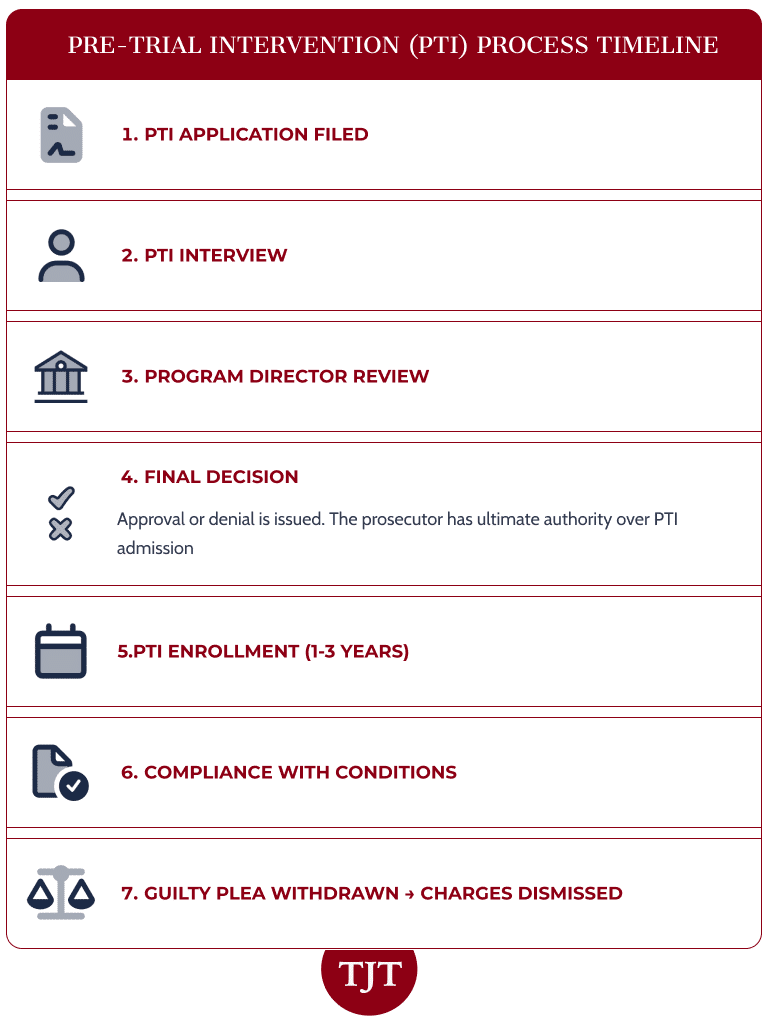New Jersey Domestic Violence PTI: Eligibility, Process & Requirements
Domestic Violence and Pre-Trial Intervention
 Domestic violence arrests in New Jersey continue to generate a significant number of criminal cases each year, often beginning with a 911 call, a quick police response, and a mandatory arrest when officers believe an act of violence or a violation of a protective order has occurred. What starts as a chaotic moment inside the home can place a person with no prior criminal history into the Superior Court system, facing indictable charges, jail time, and the possibility of a lifelong record.
Domestic violence arrests in New Jersey continue to generate a significant number of criminal cases each year, often beginning with a 911 call, a quick police response, and a mandatory arrest when officers believe an act of violence or a violation of a protective order has occurred. What starts as a chaotic moment inside the home can place a person with no prior criminal history into the Superior Court system, facing indictable charges, jail time, and the possibility of a lifelong record.
Pre-Trial Intervention(PTI) offers a potential escape valve in these situations. PTI allows for an alternative to prosecution that allows charges to be dismissed once the program requirements have been successfully completed. Instead of ending the case with a conviction, a defendant can close it with a dismissal, clearing the path to expungement and avoiding consequences that follow a permanent record.
For many first-time domestic violence defendants, this is the difference between a short-term crisis and a long-term burden. PTI shields employment prospects, licensing opportunities, and a personal reputation. It is a mechanism for preserving a clean record in cases where emotions ran high, but the defendant has no prior criminal record.
Our firm has guided countless clients through the PTI process in domestic violence matters, including third-degree assault charges, criminal restraint allegations, terroristic threats, and indictable violations of restraining orders. We understand how prosecutors evaluate these cases, what documentation strengthens an application, and the arguments that resonate with PTI directors when domestic violence allegations are at issue.
Pre-Trial Intervention Under N.J.S.A. 2C:43-12
Pre-Trial Intervention is a statutory diversion program created under N.J.S.A. 2C:43-12 that allows certain defendants to resolve indictable criminal charges without a conviction. It is designed for individuals with little or no prior record whose conduct, while serious enough to trigger prosecution, may be better addressed through supervision and rehabilitation rather than punishment. In domestic violence cases, PTI gives eligible defendants a chance to demonstrate accountability while avoiding the permanent consequences of a guilty plea.
A defendant applies for admission to a PTI program early in the case, usually after indictment or during the pre-indictment phase. If approved, the defendant enters a guilty plea that is immediately placed on hold while they serve a period of supervised PTI, generally lasting between one and three years. During this time, the court monitors compliance with conditions such as counseling, no-contact requirements, random testing, employment, or payment of fees. Once the term is completed without violations, the plea is withdrawn and the charges are dismissed.
The benefit is significant. A dismissed case means no conviction, no judgment of guilt, and no permanent criminal record. After the statutory waiting period, the arrest and PTI record can be expunged, giving the defendant a clean slate. That outcome stands in sharp contrast to a standard guilty plea, which results in a lifelong entry unless later expunged under more restrictive rules.
The PTI timeline typically begins with the filing of an application, followed by an interview with a PTI investigator, review by the prosecutor’s office, and a final decision issued by the PTI director and the court. The defendant meets regularly with a probation officer. They must complete all program conditions, which frequently include anger management programs and counseling for domestic violence cases.
Am I Eligible for Pre-Trial Intervention on a Domestic Violence Charge in NJ?
Eligibility for PTI in domestic violence matters depends on both the charge and the defendant’s background. Many domestic violence-related indictable offenses fall within the general range of approval, especially when the conduct involves third-degree or fourth-degree allegations. Simple assault, criminal mischief, and harassment are the types of charges that are ordinarily considered. Lower-level disorderly persons offenses are not handled through PTI in Superior Court and may be directed to conditional dismissal in municipal court instead.
More serious accusations create a far narrower path. A second-degree aggravated assault charge or a second-degree strangulation allegation cannot move forward without written consent from the prosecutor. That level of consent is uncommon, and most defendants facing second-degree domestic violence charges are required to proceed through the ordinary criminal process.
A clean history is essential. PTI is built for people with no prior convictions and no earlier use of diversionary programs. Someone who has completed PTI, conditional dismissal, or conditional discharge in the past will not be admitted again. Juvenile matters do not automatically prevent entry, but prosecutors often study those records. A juvenile history involving violence or repeated problems can work against the applicant.
Every domestic violence PTI application goes to the County Prosecutor’s Office for review, and each office handles these cases a little differently. The reviewing attorney studies the circumstances of the incident and considers who the defendant is as a person. They look at whether anyone was injured, whether a protective order is already in place, and how the victim feels about diversion. Those details shape how the prosecutor views the request.
Some counties take a more restrictive approach because of local policy concerns, so the same charge may be treated more cautiously depending on where the case is filed. In close calls, the defense can tip the balance. A prosecutor who is hesitant at first may shift if presented with a well-structured application that shows meaningful counseling, solid character support, and clear mitigation. Thoughtful advocacy can change the outcome in cases that sit on the line.
PTI’s Guilty Plea Requirement and Its Risks
PTI requires a guilty plea before a defendant can enter the program. The court takes the plea, but it does not enter it. Instead, the plea is placed on hold while the defendant moves through the PTI term. As long as the defendant follows every condition, the plea remains suspended. When the program ends successfully, the plea is withdrawn and the charges are dismissed.
The suspended plea still carries real risk. If the defendant violates PTI terms, the prosecutor can ask the court to activate the plea and proceed directly to sentencing. At that point, the case becomes a standard conviction with all the consequences that follow.
Immigration issues are especially dangerous. Federal authorities can treat a suspended plea as a true guilty plea, even though the State of New Jersey does not. A non-citizen can face removal, loss of status, or denial of re-entry based on that suspended plea. All non-citizens should consult an immigration attorney before agreeing to participate in the PTI program.
Professional and personal issues can come up during the PTI period as well. Some licensing boards, employers, and even housing providers want to know whether a person has an open plea or is under court supervision. PTI keeps you from ending up with a permanent record, but the supervision period itself can still affect day-to-day life. Those short-term consequences don’t last forever, yet they do require some planning and honest conversations to prevent unexpected problems.
PTI vs. Restraining Orders – Important Distinction
PTI applies only to the criminal case. It has no authority regarding restraining orders. Domestic violence incidents often create two separate court tracks that move forward at the same time. One is the criminal prosecution for offenses such as simple assault or harassment. The other is the Final Restraining Order hearing in Family Court. These two cases look related from the outside, but they operate under different rules and different burdens of proof.
PTI does not dismiss the restraining order case. It does not reduce it, delay it, or alter the outcome. The FRO hearing continues as its own civil proceeding, even while the criminal case is being diverted.
Participation in PTI can still influence strategy. Counseling records, compliance with no-contact terms, and progress reports may be reviewed by a Family Court judge. Statements made in one courtroom can affect credibility in the other. Coordinated representation is essential so one case does not undercut the other.
The criminal case requires proof beyond a reasonable doubt. The restraining order hearing requires only a preponderance of the evidence. That difference means a defendant may qualify for PTI in the criminal case while still facing a real risk of an FRO being entered. Both matters must be handled together with clear communication and a unified plan.
Standard Conditions of PTI for Domestic Violence Charges
Domestic violence PTI cases often include a set of mandatory conditions that focus on accountability and behavioral change. Courts regularly require anger-management counseling so the defendant can address triggers, communication problems, and conflict patterns. Many cases also involve specialized domestic violence intervention programs, including batterer’s intervention courses that run for several weeks. Regular reporting to a PTI supervisor is part of the structure, along with monthly supervision fees and the basic obligation to remain arrest-free during the entire term.
If substance abuse is linked to the case, scheduled drug and alcohol testing and substance abuse meetings may be ordered. Others must complete community service or pay restitution if the conduct caused property damage or medical expenses. No-contact requirements are standard, especially when an active restraining order is already in place and may be buttressed by GPS monitoring. Steady employment or continued formal education, such as GED classes, may also be ordered.
How Long Does PTI Last?
A typical PTI term lasts between one and three years. The length depends on the requirements assessed to the individual. A single misstep, such as a missed meeting or a failed drug test, can cause the defendant’s removal from the program. Some courts will extend PTI if more time is needed and progress is being made.
PTI Application Process and the Prosecutor’s Ultimate Authority

PTI applications move through two stages of review. The first stage involves the PTI Program Director and the probation department, which issues an initial recommendation. The second stage is far more important. The County Prosecutor’s Office makes the final determination. The prosecutor’s authority controls the outcome, even when the PTI office has denied or recommended acceptance. If probation denies the application, the prosecutor can still overrule that denial and admit the defendant into PTI. The reverse is also true. The prosecutor can deny PTI even when the PTI department recommends acceptance. That power reflects the core principle of the program: admission depends on prosecutorial discretion. Effective advocacy must focus on the prosecutor, not probation. Victim input also carries significant weight during this review and can influence the final decision.
When a prosecutor denies PTI, the defendant can file an appeal with the Superior Court. These appeals are difficult to win because the judge must find that the State abused its discretion. That is a high standard. The court must conclude that the prosecutor acted unreasonably or arbitrarily, not simply that the judge would have made a different choice. The burden rests entirely on the defendant. Although success is rare, appeals can succeed in cases with strong mitigation, a clear rehabilitative path, or compelling personal circumstances. An attorney familiar with PTI appeals can identify when the challenge is worth pursuing and craft the strongest argument possible under the abuse-of-discretion standard.
How to Build a Strong PTI Application for Domestic Violence Charges
Building a Strong Application Package
Effective PTI advocacy in a domestic violence case begins with a strong application package. Defense counsel should gather documentation that reflects stability, responsibility, and rehabilitation. Counseling records, proof of employment, community involvement, and character letters help create a fuller picture of the defendant as someone who had an isolated lapse in judgment rather than a pattern of harmful behavior. Early intervention is one of the most persuasive tools available. When a defendant begins anger-management or domestic-violence counseling before the application is filed, it signals genuine motivation to address underlying issues.
Strong character witnesses also help shape the narrative. Letters from employers, clergy, mentors, or long-standing community members can demonstrate that the defendant has a stable life and support network. When appropriate, the defense should address any victim-related concerns by showing steps the defendant has taken to ensure safety and prevent further conflict. A prosecutor reviewing a PTI application wants to see a clear acknowledgment of wrongdoing, sincere remorse, and a willingness to accept supervision.
Presenting Mitigating Factors
Mitigating factors can shape how a PTI application is viewed. Personal struggles with mental health, substance-use issues that are now being treated, or the emotional circumstances surrounding the incident can give important context. These details don’t excuse what happened, but they help the prosecutor understand it more fully. When the allegations involve a lower-level offense or a brief confrontation rather than serious injury, the defense can also highlight the limited nature of the conduct and the defendant’s low risk of reoffending.
Negotiating with the Prosecutor
Direct negotiation with the prosecutor is a key part of the process. Because the prosecutor makes the final decision on PTI, the defense must offer a clear and compelling explanation for why diversion is the right outcome. The strongest applications show real rehabilitation, sincere accountability, and solid reasons to believe the defendant will not end up back in the system. When those elements are present, the chances of approval increase significantly.
Understanding PTI’s Scope and Limitations
 PTI gives eligible defendants in domestic violence cases a real chance to resolve a criminal charge without a conviction or a lasting record. When the court dismisses the case after successful completion, the defendant avoids the long-term impact that follows even a low-level criminal judgment. That benefit is the reason PTI remains one of the most important tools available to first-time offenders.
PTI gives eligible defendants in domestic violence cases a real chance to resolve a criminal charge without a conviction or a lasting record. When the court dismisses the case after successful completion, the defendant avoids the long-term impact that follows even a low-level criminal judgment. That benefit is the reason PTI remains one of the most important tools available to first-time offenders.
Eligibility, however, is not automatic. A defendant must have no prior record, no history of diversion, and a charge that falls within the range of offenses the prosecutor is willing to consider. Even when those factors are present, PTI cannot be granted without the prosecutor’s approval. The prosecutor holds the final authority, and the courts rarely disturb that decision. Appeals are possible, but the abuse-of-discretion standard makes them challenging to win.
PTI also affects only the criminal case. It does not resolve, delay, or eliminate a Final Restraining Order hearing. The restraining order case continues on its own track and uses a different burden of proof. Defendants need to understand the distinction so they can avoid statements or decisions that complicate one case while trying to resolve the other.
Frequently Asked Questions (PTI) Regarding PTI for Domestic Violence Charges in NJ
Can I get PTI on a 2nd degree crime?
Possibly, in some cases. However, you can’t apply for PTI on a 2nd degree crime unless the prosecutor consents to your application.
What happens if I’m admitted into PTI?
The charges are suspended and you are placed on probation.
What happens if I successfully complete PTI?
The charges against you are dismissed.
If I complete PTI will I have a criminal record?
No, the charges are dismissed.
Do I need an expungement after PTI?
Yes, to remove the arrest record. You can file that six (6) months after you finish PTI.
On a DV charge, do I have to plead guilty to get into PTI?
Yes, that is a requirement to be admitted into the PTI program for a domestic violence offense.
Contact The Tormey Law Firm for PTI Representation in New Jersey
Experienced legal representation is essential at every stage. A knowledgeable attorney can prepare a strong PTI application, negotiate directly with the prosecutor, and identify when a denial should be appealed. Our firm handles PTI applications and PTI appeals for individuals charged with domestic violence offenses throughout Warren County, Sussex County, Morris County, and Hunterdon County. We offer free and confidential consultations for anyone facing domestic violence charges who wants to explore whether PTI is the right path forward. Contact us today at (908) 336-5008 to discuss your case and learn how we can help you pursue Pre-Trial Intervention.
Legally Reviewed By:
Travis J. Tormey, Esq.
Criminal Defense Attorney | New Jersey




